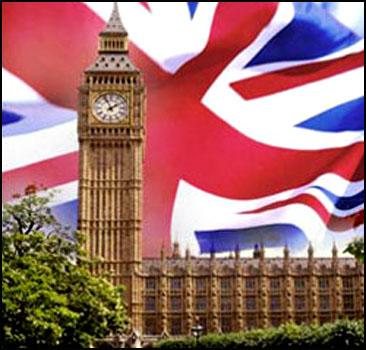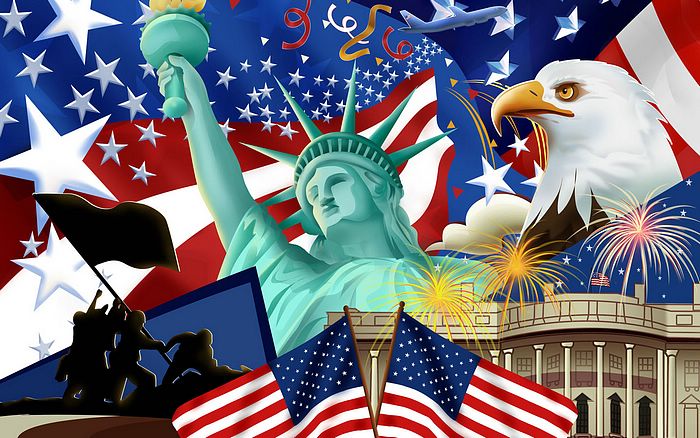|
|
|
|
 Far Far |
 WinNavigator WinNavigator |
 Frigate Frigate |
 Norton
Commander Norton
Commander |
 WinNC WinNC |
 Dos
Navigator Dos
Navigator |
 Servant
Salamander Servant
Salamander |
 Turbo
Browser Turbo
Browser |
|
|
 Winamp,
Skins, Plugins Winamp,
Skins, Plugins |
 Необходимые
Утилиты Необходимые
Утилиты |
 Текстовые
редакторы Текстовые
редакторы |
 Юмор Юмор |
|
|
|
File managers and best utilites |
Реферат на тему «Англоговорящие страны культура и традиции». Реферат на тему англоговорящие страны
Реферат на тему "Обычаи и традиции англо-говорящих стран"
| Реферат по английскому языку. Обычаи и традиции англо-говорящих стран
|
Оглавление
Введение
USA
Independence Day
Sport
Halloween
Thanksgiving
Christmas
Valentine’s Day
England
Ways of Everyday Live
Everything is Other Way Round
Lunch at 1 o’clock
English Sunday
English Tea
Fireplaces
Pubs
English Habits of Politeness
Manners in Public
British Institutes
Education in Britain
Cambridge
Transport in Britain
British Literature
Places of Interest in Great Britain
Sports in Great Britain
Заключение
Список используемой литературы
Введение
Объектом исследования моей работы являются обычаи и традиции англо-говорящих стран. И я хочу сказать, что жизнь этих стран полна традиций и кажется, весьма разумные; другие - любопытны, иногда забавны, иногда существуют лишь для привлечения туристов. Многие традиции появились очень
давно и прошли многие столетия, другие – появились сравнительно недавно. Но
некоторые из них давно пережили себя и стали обременительными и остаются лишь из-за известного английского консерватизма. Есть много традиций, связанных с историческими событиями, Парламентом, судом, университетской жизнью, а также традиции и обычаи, появляющиеся в каждодневной жизни.
Приблизительно одна треть населения земного шара разговаривают на английском языке. Для некоторых он является родным, другим – в силу исторически сложившихся обстоятельств стал вторым после родного. В странах, куда английский язык был привнесен, он искажается и трансформируется с учетом новых для него “условий жизни”, “приспосабливается” к местным обычаям и традициям, принимая различные диалектные формы.
Похожее случилось и с исконно английскими традициями. В разных местностях они приобретали собственное толкование и постепенно видоизменялись и даже до такой степени, что при сравнении вряд ли возможно найти схожие черты у старой английской традиции и у преобразовавшейся.
Цель моей работы – изучить обобщенный опыт жизни и традиций англо говорящих стран. Для людей, которые собираются путешествовать по миру особенно важно знать язык, обычаи, традиции той страны, которую они собираются посетить. Невозможно, например, приехать в Шотландию и смеяться над их национальной одеждой - клетчатыми юбками; или, например, удивляться тому, что Королева Великобритании начинает свой день с завтрака – овсяной - и это уже давно сложившийся для нее обычай. Для того чтобы избежать такой ситуации, перед тем как ехать в какую-либо страну необходимо ознакомиться хотя бы с общепринятыми обычаями этой страны.
Одной из главных традиций большинства государств мира является празднование своего национального праздника. Во Франции это День взятия Бастилии, в США – День независимости, в Германии два национальных праздника– День освобождения и День республики. В нашей стране – День суверенитета.
А как обстоят дела с национальными праздниками в Великобритании? Будучи
островным государством, Британия долгое время оказывала влияние на политическое и социально-экономическое развитие других государств. Проводя гибкую политику, Британия сумела принимать участие в большинстве международных военных конфликтах, не допустив военных действий на своей территории. Все это способствовало развитию высокому уровню жизни и благосостоянию английского народа. Англичане не ощущали особой потребности в национальном самоутверждении и в специальном дне для ликования по поводу, что они – британцы. Народ Соединенного Королевства не испытывал нужды каждый год напоминать себе и другим, что, например, британский парламент, возраст которого перевалил за семь столетий, становится еще на год старше или что тред-юнионы - самые старые профсоюзы в мире. Правда, в последние годы существования Британской империи был введен День империи, но отмечался он недолго, а выходным был лишь для школьников и учителей. В 1958 году его заменил День Содружества, который с 1966 года отмечается в июне как официальный день рождения монарха. Англичане рассуждают примерно так: «Мы уже достаточно веско заявили миру о себе, чтобы не повторяться теперь ежегодно». Но национальный праздник все-таки необходим для официальных целей – так, за границей послам полагается устраивать приемы в честь дня своей страны, они выступают по телевидению той страны, где представляют свою родину и т. д.
Национальным праздником Соединенного Королевства является день рождения монарха, о котором уже было сказано. А сейчас я хочу остановиться на том особенном, что характерно для некоторых англо-говорящих стран.
“Do you speak English?” with this phrase begins the conversation between two people, that speak different languages and want to find a common language. It’s very good when you hear: “Yes I do”, and start talking. People of different countries and nations have to get along well with the progress in world trade and technology as well as with each other. So it is very useful to learn foreign languages. Knowledge of foreign languages helps us to develop friendship and understanding among people. English is very popular now. It’s the language of computers, science, business, sport and politics. It is official language of United Kingdom, Ireland, the United States of America, Canada, Australia. There are more than 1 billion speakers of English of the World.
Speaking a foreign language you are read papers, magazines, and original books by great writers, watch satellite TV Programs. If you like traveling you can go anywhere without being afraid that other people will not understand you. English is very important to find a good job.
USA
Independence Day
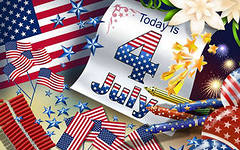
On July 4 the Americans celebrate their national holiday-independence Day. The United States gained independence as a result of gradual and painful process. By the mid 1700’s it became difficult for thirteen British colonies in the New World to be ruled by a kind 3000 miles across the. The British Empire imposed high taxes upon the colonies.
In 1774, the First Continental Congress drew up a list of grievances against the British crown. This document was the first draft of the document that would formally separate colonies from England. In 1755, the Revolutionary War began. On July 2, 1776, the Second Continental Congress presented a second draft of the list of grievances. On July 4 the Continental Congress approved the declaration of Independence. But the War of independence lasted until 1783. After the war Independence Day became an official holiday.
On July 4, Americans have holiday from work. People have day-long picnic with favorite foods like hot dog, hamburgers, potato salad, baked beans. Lively music is heard everywhere. People play baseball or compete three-legged races or pie-eating or water-melon-eating contests. Some cities have parades with people dressed as the original founding fathers who march to the music of high school bands. In the evening people gather to watch firework displays. Wherever Americans are around the globe they will get together to celebrate Independence Day.
Sport
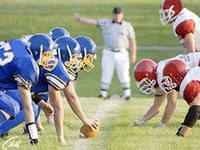
Americans’ interest in sport seems excessive to many foreign visitors. Television networks spend millions of dollars arranging to telecast sport events. Publications about sports sell widely. In the US professional athletes can became national heroes.
Sports are associated with educational institutions in a way is unique. High schools have coaches as faculty members, and school teams compete with each other.
Nowhere else in the world are sports associated with colleges and universities in the way they are in the States. College sports, especially football, are conducted in an atmosphere of intense excitement and pageantry. Games between teams attract nationwide television audiences
The sport that is most popular in most of the world-soccer-is not well known in the US. The most popular sports are football and baseball, games that are not played in large number of countries.
Spots play such an important role in American life that the sociology of sport, sport medicine, and sport psychology have become respectable specializations.
Many Americans jog every day, or play tennis or bridge two or three times a week. They go on ski trips and hunting expeditions that require weeks of planning and organizing. In Americans’ view, all these activities are worth the discomfort they may cause because they contribute to health and physical fitness. That is probably why Americans are known as a healthy nation.
Americans are very fond of sport. The most popular sports in USA are football, baseball, basketball and ice hockey.
American football derives from the English game of rugby. It started at Harvard University in the1870’s. It is a game for two teams of eleven men on field. The object of the game is to have control of the ball and to score points by carrying it across the goal-line.
Baseball is a team game derived from the English game of cricket. It is played with a bat and ball by two teams of nine players each, on a field with four bases. Baseball is the national game in the USA and it is very popular in Canada too.
Basketball is a game which nowadays is popular all over the world. It was invented in 1891. During the ‘20s the first US league championship was organized. In the ‘70s the American Championship was divided into two leagues: the ABA (American Basketball Association), which does not exist any longer and which played with a blue, red and white ball and NBA (National Basketball Association).
The NBA is a professional league which still plays.
There are more activities which Americans take part in such as golf, swimming, tennis, aerobics, wrestling, etc.
H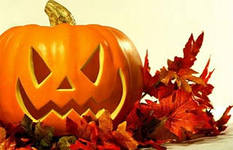 alloween
alloween
Halloween is a festival that takes place on October 31. In the us children wear costumes and masks and go trick-or-treating. Many of them carve jack-o’-lantens out of pumpkins. Fortunetelling and storytelling about ghosts and witches are popular activities.
Halloween developed from new year festivals and festivals of the dead. Christian church established a festival on November 1 called All Saints’ Day so that people could continue to celebrate their festivals. The Mass said on All Saints’ Day was called Allhallowmass. The day before All Saints Day was known all hallows Eve or Halloween.
The main Halloween activity for children is trick-or-treating. Children dress in costumes and masks and go from door to door saying “trick or treat”. The neighbors give children such treats as candy, fruit and pennies so that children do not play tricks on them.
Jack-o’-lanterns are hallowed-out pumpkins with face carved into one side. Most jack-o-lanterns contain a cantle inside. An Irish legend says that jack-o’-lanterns are named after the man called jack. He could not enter heaven because he was a miser, and he could not enter hell because he had played jokes on devil. As a result, Jack has to walk on the earth with his lantern until Judgment Day.
Fortunetelling an important part of Halloween. For example, a coin, a ring, and thimble were baked into a cake. It was believed that the person who found the ring would marry soon. And the person who found the thimble would never get married. Today people practice cardreading or palmistry.
People once believed that there were many ghosts and witches on the Earth and that they met on October 31 to worship the devil. Today, people do not believe in ghosts and witches but they like to tell stories about them on Halloween.
Thanksgiving

Almost in every culture in the world there is a celebration of thanks for rich harvest. The American Thanksgiving began as a feast of thanksgiving almost four hundred years ago.
In 1620, a religious community sailed across the Atlantic Ocean to settle in the New World. They settled in what is now known as the state of Massachusettes. Their first winter in America was difficult. They arrived too late to grow a rich harvest. Moreover, half the colony died from disease. The following spring the Iroquois Indians taught them how to grow corn. Indians showed them also how to grow other crops and how to hunt and fish.
In the autumn of 1621 they got a beautiful harvest of corn, barley, beans and pumpkins. The colonists had much to be thankful for, so they planned a feast. Local Indian chief and ninety Indians were present. The colonists learned from Indians how to cook cranberries and dishes of corn and pumpkins.
In following years many of the colonists celebrated the harvest with a feast of thanks. After the United States gained independence, Congress recommended one yearly day of thanksgiving for the whole country. Later George Washington suggested the date November 26 as Thanksgiving Day. Than, after the civil war, Abraham Lincoln suggested the last Thursday in November to be the day of thanksgiving.
On Thanksgiving Day, family members gather at the house of an older relative, even if they far away. All give thanks for everything good they have. Charitable organizations offer traditional meal to homeless.
Foods, eaten at the first thanksgiving, have become traditional. The traditional thanksgiving meal consists of roast turkey stuffed with herb- flavored bread, cranberry jelly, mashed potatoes, pumpkin pie. Other dishes may vary as to region: ham, sweet potatoes, creamed corn.
Christmas
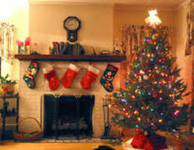
Christmas is Christian holiday that celebrates the birth of Jesus Christ. For millions of Christmas throughout the world it is the happiest and the busiest time of the year. No one knows the exact date of Christ’s birth but most Christians celebrate Christmas on December 25. The world Christmas comes from Christes maesse, an early English phrase that means Mass of Christ.
People of different countries celebrate Christmas in various ways. People in the United States and Canada decorate their homes with Christmas trees, wreaths and ornaments. City streets are filled with colored lights; the sound of bells and Christmas carols can be heard everywhere.
Children write letters to Santa Claus and tell him what presents they would like to get. Many department stores hire people to a Santa Claus costume and listen to children’s requests. People send Christmas cards to relatives and friends. Many companies give presents to their employees.
A Christmas tree is one of the main symbols of Christmas in most homes. Relatives and friends may join in trimming the tree with lights, tinsel, and colorful ornaments. Presents are placed under the tree. On Christmas Eve or Christmas morning, families open their presents. Many children believe that Santa Claus arrives on Christmas Eve in a sleigh pulled by reindeer and brings present. Some children hang up stockings so Santa Claus can fill them with candy, fruits and other small gifts.
In many parts of the United States and Canada groups of people walk from house to house and sing Christmas carols. Some people give singers money or small gifts or invite them for a warm drink. Many people attend church services on Christmas Eve or Christmas morning. They listen to readings from Bible and singing Christmas carols.
A traditional Christmas dinner consist of stuffed turkey, mashed potatoes, cranberry sauce a variety of other dishes. Some families have ham or roast goose instead of turkey. Pumpkin pie, plum pudding, and fruitcake are favorite desserts.
Valentine’s Day
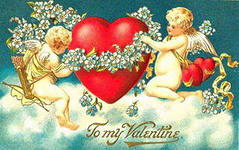
There are several legends about St. Valentine’s Day. One of the legends says that Valentine was Christian pries who lived in the 3 century A.D. he was put into prison by roman authorities for his teachings and was beheaded on February cured his jailer’s daughter of her blindness. Before the execution he wrote her a letter signed “From Your Valentine”. Another legend says that the same Valentine wrote to children and friends who loved him from the jail.
According to another legend, Valentine was an Italian bishop who lived at about the same time. He was thrown into prison because he secretly married couples, contrary to the laws of the Roman Empire. The legend says that he was burnt at the stake.
February 14 was also a Roman holiday. On this day young men randomly chose the name of the girl to escort to the festival. The custom of choosing a sweetheart on this day became very popular in the medieval Europe. Later this custom spread to American colonies.
Now, St. Valentine’s Day is the day of sweethearts. On this day, people show their friends relatives and loved ones that they care. People send candy of flowers to those whom they love. Most people send “valentines”, greeting cards named after St. Valentine’s letters written from jail.
Valentines can be sentimental and romantic, or funny and friendly.
Valentines can be anonymous. Valentines can be heard-shaped or can carry hearts on them. People buy valentines or make them themselves.
England
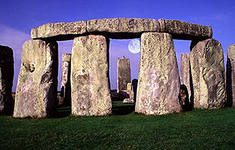
England is the largest and the richest country of Great Britain. The capital of England is London but there are other large industrial cities, such as Birmingham, Liverpool, Manchester and other famous and interesting cities such as York, Chester, Oxford and Cambridge.
Stonehenge is a one of the most famous prehistoric places in the world. This ancient circle of stones stands in South-west England. It measures 30 metres across and made with massive blocks of stone up to four metres high. Why it was built is a mystery.
Not far from Stonehenge stands Salisbury Cathedral. It is a splendid example of an English Gothic Cathedral; inside there is one of four copies of Magna Charta and the oldest clock in England.
Chester is very important town in the north-west of England. In the past it used to be a Roman fort; its name comes from the Latin word castra, meaning “fortified camp”. In Chester there is a famous museum which contains over 5000 ancient and modern toys.
Oxford is the home of the oldest university of England. The most famous college is Christ Church. It has a great hall which was build during the reign of Henry 8 and its chapel has become the Cathedral of Oxford.
Cambridge is the capital of Britain’s second oldest university.
York was the capital of Northern England. It is one of the best preserved medieval cities of Europe. It was build by Romans, conquered by Anglo-Saxons and ruled by the Vikings. Birmingham is often called the “City of 1500 trades” because of the great variety of its industries.
Ways of Everyday Live
Very often when speaking of English traditions we think first of some curious theatrical ceremonies of the court* or parliament procedure. There come to our mind the medieval uniforms of the guards, the solemn cloaks and wigs of the judges or the top hats (bowlers) and the invariable umbrellas of the clerks of the London City.
But the word “tradition” does not mean only that. First and foremost “tradition” is the generally accepted made or way of living, acting, behaving of just doing things. There are many very good traditions of this kind in the everyday life of the English.
Everything is the Other Way Round
In England everything is the other way round. On Sunday on the Continent even the poorest person puts on his best suit, tries to look respectable, and at the same time the life of the country becomes gay and cheerful; in England even the richest peer or motor-car manufacturer dresses in some peculiar rags, does not shave, and the country becomes dull and dreary.
On the Continent there is one topic, which should be avoided – the weather; in England, if you do not repeat the phrase “Lovely day, isn’t it?” at least two hundred times a day, you are considered a bit dull. On the Continent Sunday papers appear on Monday; in England – a country of exotic oddities – they appear on Sunday.
On a continental bus approaching a request stop the conductor rings the bell if he wants his bus to go on without stopping; in England you ring the bell if you want the bus to stop. On the Continent people have good food; in England people have good table manners.
On the Continent public orators try to learn to speak fluently and smoothly; in England they take a special course in Oxonian stuttering.
On the Continent learned person love to quote Aristotle, Horace, Montaigne and show off their knowledge; in England only uneducated people show off their knowledge, nobody quotes Latin or Greek authors in the course of a conversation, unless he has never read them.
Continental people are sensitive and touchy; the English take everything with an exquisite sense of humour – they are only offended if you tell them that they have no sense of humour.
People on the Continent either tell you the truth or lie; in England they hardly ever lie, but they would not – dream of telling you the truth.
Many continentals think life is a game; the English think cricket is a game.
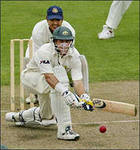
Lunch at 1 o’clock
Many foreigners are sometimes taken aback when they are faced with this typically English custom for the first time.
Whatever one is doing, no matter how important it is, or seems to be – a parliamentary debate or any kind of business routine – as soon as the clock strikes one everybody breaks for lunch.
The time from one to two o’clock is a “sacred” hour in England. And it appears to be not only good for health – having meals at regular times is certainly healthy – but it is very convenient socially as well. Everybody knows that there is no use trying to get in touch with some official, business executive or firm representative at this time. They won’t be in. it is no use no waste your time going from one shop to another at one o’clock sharp they will open. For punctuality is also one of the English
traditions.
English Sunday
The so called Sunday Observance laws* prohibiting all kind of public entertainment on Sunday date back to the 17-18 century. The idea was to encourage people to go church and not to allow them “to profane the Lord’s Day” by amusing themselves.
Three hundred years have passed since then. Church services are attended by fewer people now than some decades ago. But the old custom of having a quiet Sunday is still alive. This is another English tradition preserved by law.
On Sunday you may visit a museum or go to a concert but all shops, theatres, dance and music halls are closed. This is rather illogical when compared with the unrestricted variety programmes on radio and television or the fact that one can always go to the bingo-club to enjoy himself or to the cinema to see a “thriller” or the latest American “hit”.
Pubs* and restaurants are open only from 12 to 2, and from 5 to 10 p.m. The police are very strict and do not hesitate to withdraw the licence from the proprietors who disregard closing time.
English Tea
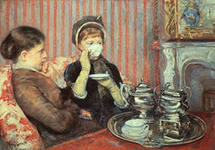
The trouble with the tea is that originally is was quite a good drink. So a group of the most eminent British scientists put their heads together, and made complicated biological experiments to find a way of spoiling it. To eternal glory of British science their labour bore fruit. They suggested that if you do not drink it clear, or with lemon or rum and sugar, but pour a few drops of cold milk into it, and no sugar at all, the desired object is achieved. Once this refreshing, aromatic, oriental beverage was successfully transformed into colorless and tasteless gargling-water, it suddenly became the national drink of Great Britain and Ireland – still retaining, indeed usurping, the high-sounding title of tea.
There are some occasions when you must not refuse a cup of tea, otherwise you are judged an exotic and barbarous bird without any hope of ever being able to take your place in civilized society.
If you are invited to an English home, at five o’clock in the morning you get a cup of tea. It is either brought in by a heartily smiling hostes or an almost malevolently silent maid. When you are disturbed in your sweetest morning sleep you must not say: “Madame (or Mabel), I think you are a cruel, spiteful and malignant person who deserved to be shot.” On the contrary, you have to declare with your best five o’clock smile: “Thank you so much. I do adore a cup of early morning tea, especially early in the morning.” If they live you alone with the liquid, you may pour it down the
washbasin.
Than you have tea for breakfast; then you have tea at eleven o’clock in the morning; then after lunch; then you have tea for tea; then for supper; and again at eleven o’clock at night. You mast not refuse any additional cups of tea under the following circumstances: is it is hot; if it is cold; if you are tired; if anybody thinks that you might be tired; if you are nervous; if you are gay; before you go out; if you have just returned home; if you feel like it; if you do not feel like it; if you have had no tea for some time; if you have just had a cup…
Fireplaces
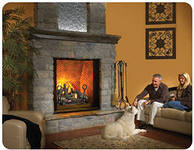
In English homes, the fireplace has always been, until recent times, the natural center of interest in a room. People may like to sit at a window on a summer day, but for many months of the year prefer to sit round the fire and watch the dancing flames.
In the Middle Ages the fireplaces in the halls of large castles were very wide. Only wood was burnt, and large logs were carted in from the forests, and supported as they burnt, on metal bars. Such wide fireplaces may still be seen in old inns, and in some of them there are even seats inside the fireplace.
Elizabethan fireplaces often had carved stone or woodwork over the fireplace, reaching to the ceiling. There were sometimes columns on each side of the fireplace. In the 18th century, place was often provided over the fireplace for a painting or mirror.
When coal fires became common, fireplaces became much smaller. Grates were used to hold the coal. Above the fireplace there was usually a shelf on which there was often a clock, and perhaps framed photographs.
Pubs
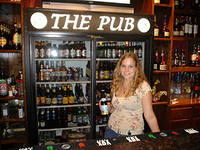
Do you know what a pub is? The Oxford Advanced Learner's Dictionary defines it as a public house or building where people go to drink and to meet their friends. English men like to get together in the pub in the evening. The usual opening hours for pubs are on weekends from 11 a.m. to 3 p.m. and 5 p.m. to 10.30 p.m. On Sundays pubs may remain open for not more than 5 and a half hours.
Pubs usually have two drinking rooms called bars - the public and the saloon bar, which is more comfortable but more expensive. "Bar" also means the counter at which drinks are served.
Pubs serve alcoholic and other drinks and often light meals. The main drink served in pubs, is, of course, beer, light or dark. Light beer is usually called bitter. As for other kinds of alcohol, most pubs serve whisky, gin and wine. Beer is always sold in pint or half-pint glasses. A pint is equivalent to 0.57 liter No alcoholic drinks may be served to young people under eighteen under British law.
In Great Britain today there are some 80,000 pubs situated in different cities, country towns, villages, and so on. Of London's 5.000 pubs some of the most interesting are right by the River Thames, downstream as well as up. Every English pub has its own sign and name. Some people refer to pub signs as a great open-air portrait gallery, which covers the whole country. But actually this gallery includes far more than portraits.
Some pub signs present different types of transport such as coaches, trams, ships, airplanes and even flying boards. There are signboards depicting animals, birds, fish as well as kings and queens, dukes and lords, sailors, soldiers, fat men and giants. A first class example of an heraldic pub sign is found near Leeds in
Yorkshire at Burley. The Butcher's Arms can be seen in Gloucestershire on a small typical English country pub near Sheepscombe.
At Cheltenham also in the same county you will see a sign showing the head of a horse, the name of the pub being Nags Head. At the village of Slad, also in Gloucestershire you can have a pint of lager in Woolpack and this pub sign shows a horse with two heavy packs of wool slung over it.
In Wales the most attractive sign in a number of pubs share the name of Market Tavern because all of them are on the pubs adjoining the market place.
In London the famous Sherlock Holmes pub with the big portrait of the famous detective smoking his favourite pipe attracts thousands of visitors Northumberland Avenue.
History, geography, fairytales are kept alive by the name or sign of the "local" (the neighbourhood pub). As history is being made, so the owners of the pubs - usually the brewery companies - and individual publicans are quick to record it by new signs. Typical example is the "Sir Francis Chichester" named after the first man to sail alone around the world.
Not all British pubs have individual signboards, but a considerable effort is being made now to retain old signs. Jerome K. Jerome, the creator of the internationally known book "Three Men In a Boat" over a hundred years ago revealed himself at probably his most authoritative intro matter or pubs. He clearly was a pub man and you can consider his famous book not only a guidebook to the Thames but as the first of those now familiar surveys of recommended places where to sleep, eat and enjoy beer. But in many pubs one can also enjoy some traditional pub games. There are darts, cards, skittles, coin games and various table games, of which playing darts is the oldest one.
Some of these games are difficult to find, as pubs have updated their amenities by offering TV and video games, such as two-men tennis, fruit machines, pinball machines, and so on. There are also other pub entertainments, such as piano playing, folk-singing, jazz performances and even theatres. However, if such table games as billiards or table football which are played with two or four players as well as cards, dominoes and coin games are known in this country, skittles and darts are less familiar.
Skittles is one of the oldest pub games and dates back to medieval England, the object of the game being to knock down as many skittles as possible with a wooden ball. This pub game has lots of variations all over Britain. Darts is also an old game, ' which was played by the Pilgrims in 1620 when they sailed, from England to the New World. That is why it is well known in the USA, too. To play this game one must first of all have a standard dartboard with numbers marked on it to indicate score. The outer ring counts double, the middle one treble while at the very centre is the bull (50) with its own outer circle (25). Dart players should stand at least eight feet away from the board. The aim of the game is to score as quickly as possible with the least number, of throws. The actual score a player must get depends on the variety of game he is playing. Many pubs in Great Britain have their own darts teams. So, if you come to Britain drop in a pub, enjoy a pint of bitter and a "tongue sandwich, which speaks for itself”.
It sounds funny to foreigners but when it is closing time, the pub barman calls "Time!" or "Time, gentlemen, pleaser!”
English Habits of Politeness
Some greetings in England are very informal: a simple “good morning” or a wave of the hand across the street is quite enough. Handshakes are only exchanged on a first introduction or as a token of agreement or congratulation. “Sorry” takes the place of “no” when you cannot do something for a person or give a positive answer in situation like “May I use your pen?”, “Do you know the time?” or “Have you any size seven shoes?”. “Pardon” is the polite way of asking somebody to repeat what he has said.
English people do not readily ask each other to do anything, they prefer to wait for a service to be offered before asking for it. If they do ask, then they say something like “I don’t really like asking you, but…”
It is considered polite to give up one’s seat a woman who is standing, to open door for her, carry things for her, and so on.
Manners in Public
Our manners in public, like our manners in our homes, are based on self- respect and consideration for other people.
It is really surprising how stingy we are with our “Please” when we ask anyone to do something for us. We unwillingly part with our “Thank you”, as
it were the most difficult and costly thing in the world. We don’t stand aside for others to pass us in the trams, buses or the underground. We don’t rice to let people pass us to their seats in the theatres or movies.
1.Not to make yourself conspicuous, not to attract unfavourable attention to yourself or others, here are some of the rules for correct behaviour in a public place.
2.Not to be conspicuous, don’t wear conspicuous clothes.
3.One should not talk loud or laugh loud.
4.No matter how trying the circumstance, do not give way to anger or uncontrolled emotion.
5.Never eat anything in the street, or in a public place (restaurants, buffets and cafes excluded).
6.Do not rudely push your way through crowds.
7.Never stare at people or point at them.
8.Do not ridicule or comment on anyone in public.
9.Reserve “affectionate demonstration” (kissing, embracing, etc.) for appropriate places.
10.Don’t monopolise the sidewalk, by walking 3 or 4 abreast, or by stopping in the centre to speak with someone.
11. When in the street keep to the right.
British institutes
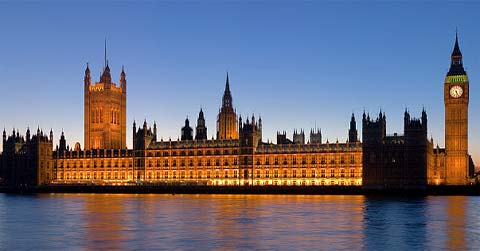
Parliament is the most important authority in Britain. Parliament first met in the 13th century. Britain does not have a written constitution, but a set of laws. In 1689 Mary II and William III became the first constitution monarchs. They could rule only with the support of the Parliament. Technically Parliament is made up of three parts: the Monarch, the House of Lords and the House of Commons.
The continuity of the English monarchy has been interrupted only once during the Cromwell republic. Succession to the throne is hereditary but only for Protestants in the direct line of descent. Formally the monarch has a number of roles. The monarch is expected to be politically neutral, and should not make political decisions. Nevertheless, the monarch still performs some important executive and legislative duties including opening and dissolving Parliament, singing bills passed by both Houses and fulfilling international duties as head of state. The present sovereign is
Queen Elizabeth II who was crowned in Westminster Abbey in 1953.
The House of Lords comprises about 1,200 peers. The house is presided over by the Lord Chancellor. The House of Lords has no real power but acts as an advisory council for the House of Commons. As well as having legislative functions, the Lords is the highest court of appeal.
The House of Commons consist of members of Parliament who are elected by the adult suffrage of the British people in general elections which are held at least every five years. The country is divided into 650 constituencies each of which elects one Member of Parliament. The Commons therefore, has 650 Members of Parliament. The party which wins the most seats forms the Government and its leader becomes the Prime Minister. The functions of Commons are registration and security of government activities. The house is presided over by the Speaker. The government party sits on the Speaker’s right while on his left sit the members of the Opposition.
Education in Britain
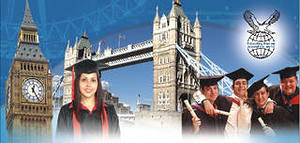
In England and Wales compulsory school begins at the age of five, but before that age children can go to a nursery school, also called play school. School in compulsory till the children are 16 years old.
In Primary School and First School children learn to read and write and the basis of arithmetic. In the higher classes of Primary School (or in Middle School) children learn geography, history, religion and, in some schools, a foreign language. Than children go to Secondary School.
When students are 16 years old they may take an exam in various subjects on order to have a qualification. These qualifications can be either G.C.S.E. (General Certificate of Secondary education) or “O level” (ordinary level). After that students can either leave school and start working or continue their studies in the same school as before. If they continue, when they are 18, they have to take further examinations which are necessary for getting into university or college.
Some parents choose private schools for their children. They are very expensive but considered to provide a better education and good job opportunities.
In England there are 47 universities, including the Open University which teaches via TV and radio, about 400 colleges and institutes of higher education. The oldest universities in England are Oxford and Cambridge. Generally, universities award two kinds of degrees: the Bachelor’s degree and the Master’s degree.
Cambridge
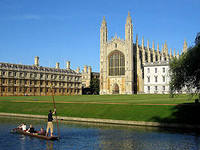
Cambridge is situated at a distance of 70 miles from London; the greater part of the town lies on the left bank of the river Cam crossed by several bridges.
Cambridge is one of the loveliest towns of England. It is very green presenting to a visitor a series of beautiful groupings of architecture, trees, gardens, lawns and bridges. The main building material is stone having a pinkish color which adds life and warms to the picture at all seasons of the year.
The dominating factor in Cambridge is University, a center of education and learning. Newton, Byron, Darwin, Rutherford and many other scientists and writers were educated at Cambridge. In Cambridge everything centers on the university and its Colleges, the eldest of which was founded in 1284. They are 27 in number. The college is a group of buildings forming a square with a green lawn in the center. An old tradition does not allow the students to walk on the grass, this is the privilege of professors and head- students only. There is another tradition which the students are to follow: after sunset they are not allowed to go out without wearing a black cap and
a black cloak.
The University trains about 7.000 students. They study for 4 years, 3 teams a year. The long vacation lasts 3 months. They are trained by a tutor; each tutor has 10-12 students reading under his guidance. There is a close connection between the University and colleges, through they era separate in theory and practice.
A college is a place where you live no matter what profession you are trained for; so that students studying literature and those trained for physics belong to one and the same college. However the fact is that you are to be a member of a college in order to be a member of the University.
The students eat their meals in the college dining-hall. At some colleges there is a curious custom known as “sooncing”. If a should come late to dinner or not be correctly dressed or if he should break one of the little unwritten laws of behaviour, then the senior student present may order him to be “soonced”. The Butler brings in a large silver cup, known as “sconce cup”, filled with offender, who must drink it in one attempt without taking the cup from his lips. (It holds two and half pints). If he
succeeds then the senior student pays for it, if not, the cup is passed round the table at the expense of the student who has been “sconced”. Now the origin of this custom.
Until 1954, undergraduates (students studying for the first degree) had to wear cloaks, called gowns, after dark, but now they are only obliged to wear them for dinner and some lectures. This tradition is disappearing, but one which is still upheld is that of punting on the Cam. It is a favorite summer pastime for students to take food, drink, guitars (or, alas, transistor radios) and girl friends on to a punt (a long, slim boat, rather like a gondola) and sail down the rive, trying very hard to forget
about exams. Many students feel that they have not been christened into the University until they have fallen into the River Cam. This has almost become a tourist attraction.
Students also have an official excuse to “let themselves loose” once a year (usually in November) on Rag Day*.
On this day, hundreds of different schemes are thought up to collect money for charity, and it is not unusual to see students in the streets playing guitars, pianos, violins, singing, dancing, eating fire, fishing in drains for money, or even just lying in beds suspended over the street swinging a bucket for money to be thrown into.
On May 21st every year, Eton College and King’s College, Cambridge, honour the memory of their founder, Henry VI, who died very suddenly, and was almost certainly murdered, in the Tower of London on that day in 1471. he is generally supposed to have been killed whilst at prayer in the Oratory of the Wakefield Tower, and here, on the anniversary, the Ceremony of the lilies and Roses now takes place. Representatives of both colleges walk in procession with Beefeaters and the Chaplain of the Tower, and the short service is conducted by the latter, during which a player composed by Henry himself is said. A marble tablet in the in the Oratory marks the
place where the King is believed to have died, and on each side of it flowers are laid - lilies from Eton bound with pale blue silk, and white roses from King’s College, bound with purple ribbon. They are left there for twenty-four hours, and then they are burnt.
Transport in Britain
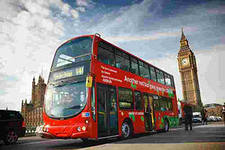
You can reach England either by plane, by train, by car or by ship. The fastest way is by plane. London has three international airports: Heathrow, largest, connected to the city by underground; Gatwick, south of London, with a frequent train service; Luton, the smallest, used for charter flights.
If you go to England by train or by car you have to cross the Channel. There is a frequent service of steamers and ferry-boats which connect the continent to the south-east of England.
People in Britain drive on the left and generally overtake on right. The speed limit is 0 miles per hour (50km/h) in towns and cities and 70 mph (110 km/h) on motorways.
When you are in London you can choose from different means of transport: bus, train, underground or taxi. The typical bus in London is a red double-decker. The first London bus started running between "> The next to arrive were the trains; now there are twelve railway stations in London. The world’s first underground line was opened between Baker St. and the City in 1863. Now there are ten underground lines and 273 underground is also called the Tube, because of the circular shape of its deep tunnels.
British Literature
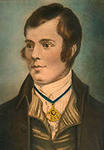
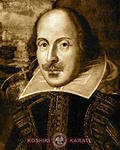
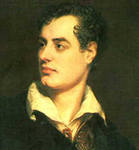
Great Britain gave the world a lot of talented people. Many famous writers and poets were born in Great Britain.
One of the best known English playwrights was William Shakespeare. He draw ideas for his tragedies and comedies from the history of England and ancient Rome. Many experts consider Shakespeare the greatest writer and the greatest playwright in England language. William Shakespeare wrote 37 plays which may be divided into: comedies (such as A Midsummer Night’s Dream), tragedies (such as Hamlet, Othello, King Lear, Macbeth) and historical plays (such as Richard II, Henry V, Julius Caesar, Anthony and Cleopatra).
Robert Burns represents the generation of Romantic writers. In his poems he described with love and understanding the simple life he knew.
Among his well-known poems are Halloween, The Jolly Beggars, To a Mouse.
George Gordon Lord Byron. His free-spirited lie style combined with his poetic gift makes him one of the most famous figures of the Romantic Era. His famous works such as Stanzas to Augusta, The Prisoner of Chillon, Childe Harold’s Pilgrimage, Manfred draw readers into the passion, humors and conviction of a poet whose life and work truly embodied the Romantic spirit.
Sir Walter Scott wrote the first examples of historical novel; Lewis Carroll became famous when he published Alice’s Adventures in Wonderland.
Places of Interest in Great Britain
Britain is rich in its historic places which link the present with the past.
The oldest part of London is Lud Hill, where the city was originated. About a mile west of it there is Westminster Palace, where the king lived and the Parliament met, and there is also Westminster Abbey, the coronation church.
Liverpool, the “city of ships”, is England’s second greatest port ranking after London. The most interesting sight in the Liverpool is the docks. They occupy a river frontage of seven miles. The University of Liverpool, established in 1903, is noted for its school of Tropical Medicine. And in the music world Liverpool is a well-known name, for it’s the town of “The Beatles”.
Stratford-on-Avon lies 93 miles north-west of London. Shakespeare was born here in1564, and here he died in 1616. Cambridge and Oxford Universities are famous centers of learning.
Stonehenge is a prehistoric monument, presumably build by Druids, members of an order of priests in ancient Britain. Tintagel Castle is King reputed birthplace. Canterbury is the seat of the Archbishop o Canterbury, head of the Church of England.
The British Museum is the largest and riches museum in the world. It founded in 1753 and contains one of the world’s richest collections of antiquities. The Egyptian Galleries contain human and animal mummies. Some parts of Athens’ Parthenon are in the Greek section.
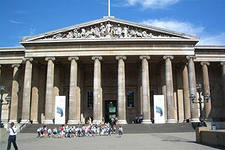
Madam Tussaud’s Museum is an exhibition of hundreds of life-size wax models of famous people of yesterday and today. The collection was started by Madam Tussaud, a French modeler in wax, in the 18 century. Here you can meet Marilyn Monroe, Elton John, Picasso, the Royal family, the Beatles and many others: writers, movie stars, singers, politicians, sportsmen, etc.
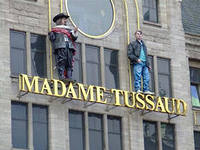
Sports in Great Britain
British people are very fond of sports. Sport is a part of their normal life. The two most popular games are football and cricket.
Football, also called soccer, is the most popular sport in the United Kingdom. England, Wales, Scotland and Northern Ireland have their own Football Leagues and national teams. Games are played on Saturday afternoons from August to April. In addition to the FL games there is a competition called the Football Associations Cup. The Cup Final is played at Wembley Stadium(London) in May.
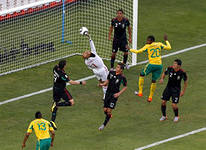
Cricket is considered to be the English National game. Its rules are very complicated. Two teams of eleven men each play it, the player at a time tries to hit ball with a bat.
Golf is the Scottish national game. It originated in the XV century and the most famous golf course in the world, known as a Royal and Ancient Club, is at St. Andrew’s.

Lawn tennis was first played in Britain in the late 19th century. The most famous British championship is Wimbledon, played annually during the last week of June and the fist week of July.
Those are the most popular kinds of sport in the UK. But there are many other sports such as rugby, golf, swimming, horse-racing and the traditional fox-hunting.
Заключение
В заключение своей работы хочу отметить, что в англо-говорящих странах имеют место интересные и разнообразные традиции и обычаи. Несмотря на то, что традиции попали из других странах в иные “условия жизни”, обусловленные местными особенностями, тем не менее своими корнями они уходят в далекое противоречивое прошлое Великобритании.
Поражает то, что на протяжении многих веков, они смогли сохраниться, выжить и остаться актуальными в современном мире высоких технологий. Эти обычаи и традиции и сейчас современны, продолжают существовать в англо-говорящих странах, чем и привлекают людей, интересующихся историей и развитием этих стран.
Изучение традиций англо-говорящих стран помогает глубже понять и воспринять условия жизни людей, их социальный статус, историю страны или
отдельных ее регионов.
Список используемой литературы
1. Кощеева Н.Е. English Reader Part II. English National Traditions М. 1972.
2. Пинягин Ю.Н. Великобритания: история, культура, образ жизни – Пермь: Изд-во Перм. Ун-та, 1996. – 296.
3. Сатинова В.М. Читаем и говорим о Британии и британцах. Мн.: Выш. шк., 1997. – 255с.
4. Традиции, обычаи и привычки. М.: ИНФРА-М, 2001. – 127с.
infourok.ru
Презентация на тему English-speaking countries (Англо-говорящие страны)
Слайд 1
ВЫПОЛНИЛА РАБОТУ СТУДЕНТКА ГРУППЫ Б-0811 ТЕРЕЩЕНКО АЛЁНА Преподаватель Водолазская И.Е. English-speaking countriesСлайд 2
English-speaking countries English-speaking countries are: Great Britain, USA, Canada, Australia, New Zealand. К англо-говорящим странам относятся: Великобритания, США, Канада, Австралия, Новая Зеландия.
Слайд 3
The UK The United Kingdom of Great Britain and Northern Ireland consists of 4 parts: Wales, Scotland, Northern Ireland and England. Соединенное королевство Великобритании и северной Ирландии состоит из 4 частей: Уэльс, Шотландия, Северная Ирландия и Англия.
Слайд 4
The UK The British Isles are group of islands which lie out of the northwest coast of the European continent. Британские острова - это группа островов, которые лежат вне северо-западного побережья Европейского континента.
Слайд 5
The UK There are no high mountains, no long rivers, no large forests in the UK. The population of Britain is nearly 56 million people. Britain is a capitalist English-speaking country. В Великобритании нет высоких гор, нет длинных рек и густых лесов. Население Великобритании почти 56 млн. человек. Великобритания - капиталистическая англо-говорящая страна.
Слайд 6
The United States of America The USA is located in the central part of the North American continent. The population of the USA makes more than 236 million people. The USA is a highly developed industrial English-speaking country. США расположены в центральной части североамериканского континента. Население США составляет более 236 млн.человек. США являются высокой развитой индустриальной англо-говорящей страной.
Слайд 7
The United States of America There are two main political parties: the Democratic Party and the Republican Party. Там существуют две основные политические партии: демократическая партия и республиканская партия.
Слайд 8
The United States of America The United States - is a multinational country, so people in the USA speak English and other languages. But English is the state language. Соединенные штаты - это многонациональная страна, поэтому там разговаривают как на английском, так и на других языках. Но государственным языком является английский.
Слайд 9
Canada Canada has an area of about 10 million square kilometers. Its west coast is washed by the Pacific Ocean and the east coast of the Atlantic Ocean. Канада имеет площадь около 10 млн.квадратных км. Ее западное побережье омывается Тихим океаном, а восточное побережье Атлантическим океаном.
Слайд 10
Canada Canada's population is over 26mln. people. Canada is a member of the Commonwealth. Население Канады составляет более 26млн.человек. Канада является членом Содружества.
Слайд 11
Australia Australia has the area about 8 million square km. The union of territories of Australia includes: continent of Australia, island of Tasmania and number of small islands. Австралия имеет площадь около 8 млн.квадратных км. В состав союза территорий Австралии входят: континент Австралии, остров Тасмания и ряд мелких островов.
Слайд 12
Australia The population of Australia is more than 16 million people. The Australian Union is a capitalist self-operating federal state. Население Австралии более чем 16 млн.человек. Австралийский Союз является капиталистическим федеративным государством.
Слайд 13
New Zealand New Zealand is situated to the south-east of Australia. It is located on big islands: North Island, South Island and Stewart Island, as well as many small islands. Новая Зеландия расположена к юго-востоку от Австралии. Она расположена на больших островах: Северный остров, Южный остров и остров Стюарта, а также занимает множество маленьких островов.
Слайд 14
New Zealand The population of New Zealand is more than three million people. New Zealand is a capitalist state and self-governing member of the Commonwealth. Население Новой Зеландии составляет более трех млн.человек. Новая Зеландия является капиталистическим самоуправляющим государством и членом Содружества.
nsportal.ru
Реферат - Англоговорящие страны культура и традиции
Англоговорящие Страны: Культура и Традиции
Слово «культура» имеет различные значения. Это часто обращается к музыке, литературе, искусству, и высшему образованию. Это также означает таможню общества и пути, которым люди взаимодействуют с друг другом.
Каждая культура имеет определенные основные идеи, которые каждый принимает для предоставленного. Они — фундаментальные вещи, которые каждый «знает» от его или её детства, и которые являются автоматическими людям, которые живут в той культуре. Они включают все от общих знаков внимания и деталей ежедневной жизни к более глубоким проблемам места человека в обществе, семьи, жизни и смерти.
Когда человек входит в новую культуру, основная таможня и идеи, которые он или она автоматически принял, возможно, больше не верны. Человек оказывается перед новым набором таможни и отношений, чтобы пробовать понять. Позвольте нам изучать некоторые элементы культуры Англоговорящих стран и традиций.
. Представление там очень просто: Вы заявляете ваше название, где Вы живете и ваше занятие. В формальной ситуации используют ваши первые и последние названия. В стороне или в социальном урегулировании, используйте ваше имя только. Мужчины представлены женщинам, молодые люди к старшим, старые друзья вновь прибывшим, и молодым девочкам к женатому. Обычно женщины не представлены человеку.
Вводя каждый говорит кое-что как: «госпожа Смит, может я представлять г. Брауна», и затем превращение госпоже Смиту просто говорит «госпожу Смита». Обычный ответ на введение — «Как Ваши дела ?», который является своего рода поздравлениями и не вопросом — очень формальный. Можно сказать кое-что менее формальное: «Хороший встречать Вас,» «я рад встретить Вас,» или «Счастливый встретить Вас.» Если Вы не знает название человека, говорят «Сэр» человеку или «Госпоже» женщине. Если семейное положение леди неизвестно, она должна быть названа как госпожа [miz]. Однако, было бы намного более цивилизованное изучить название человека и сказать: «Хороший встречать Вас, госпожу Браун.» Люди обычно обмениваются рукопожатием твердо особенно когда формально введено, но они не всегда обмениваются рукопожатием с людьми, которых они видят часто.
Определенные типы поведения ожидаются в Англоговорящих странах. Американская идентичность очень перевязана с домашним происхождением. Беседы между двумя американцами, чтобы встретиться за границей будут обычно включать раннее, сосредотачиваются на домашних государствах или колледжах, тогда как это маловероятно с двумя Англичанами (предполагающий, что они говорили с друг другом вообще). Прозвища очень чаще используются в США чем в Великобритании.
Люди в обеих странах рассматривают время как дорогой объект или 'материал. Они говорят об этом многими различными способами. Они экономят это, тратят впустую это, тратят это, убивают это. Они имеют свободное время, досуг, свободное время. Они вкладывают капитал в это и тщательно планируют это. Тогда никогда не опоздайте. Это не традиция, чтобы заглядывать к знакомым без запроса. Будьте вежливы и дружественные в общественных местах. Фразы как «Извиняют меня» и «я сожалею», используются намного более часто чем в России. Люди там также очень заинтересованы уходом. Ежедневно ливни и набор fr.eshодежды — норма. Никогда не спросите людей их возраст. Улыбка и люди улыбнутся с Вами.
Я буду. OTBeTbTenaeonpocbi.
1. Каковы два значения слова «культура»?
2. Как Вы обращаетесь к незнакомцам?
3. Представьтесь формально.
4. Представьтесь неофициально.
5. Что человек может сделать с его/ее временем?
.6. Действительно ли необходимо назначить встречи в России? Когда это необходимо? Когда не это необходимый?
KoMMewrap
111. 3anoMHMTe 3-ый cnoBaw cociaBbTechmmmnpeA/ioxeHwa.
| Существительные | CyiijeciiieumejibHbie |
| введение | ocjiHMHa/ibHoe npeAcTaBJiemie |
| сначала / христианин / данный название | HMJI |
| фамилия / секунда / длится / фамилия | (fjaMHJlHfl |
TecTXI. h4 MeTbipexnpeA^oxeHHbixBapnaHTOBBbiSepmeeflMHCTBeH-
1. Стог хотел бы найти… действительно хорошая работа.
A. a
B.
C.
D . -
2. Они не сделали… слово об их планах.
A. сказать.
B. разговор
C. говорить
D. сказать
3.Интересно когда она… завтра.
A. прибыл бы
B. прибудет
C. прибывает
D. прибытие
4. Счет не ..., поскольку я думал, что это будет.
A. такое дорогое
B. дорогой
C. столь дорогой
D. более дорогой
5. Никто… Джулия, чтобы прибыть столь поздно.
A. ожидаемый
B. ждавший для
C. разыскиваемый
D. ожидавший
6. Если бы это… столь поздно я назвал бы Вас.
A. не имеет
B. не был
C. не имел
D. не был
7. Правление… все мои предложения.
A. брошенный
B. выключаемый
C. отказанный
D. подавленный
8. Мы путешествовали по большому количеству… поездом и на машине.
A. также
B. или
C. оба
D . ~
9. Современный английский язык начался… пятнадцатое столетие.
A. в
B.
C. от
D. в
10. Питер выглядел очень взволнованным....
A. в последнее время
B. на днях;.
C на днях
D. на следующей неделе
II Я хочу пить, я хотел бы немного минеральной воды, но мы не имеем
A. некоторые
B. любой
C. ничто
D. что — нибудь
12. Менеджер сказал его секретарю… на работе.
A. не курить
B. не курить
C. не курят
D. никакое курение
13. Встреча была отменена.… тяжелый снегопад.
A. в результате
B. хотя
C. из-за
D. потому что
14. Викай спросила Маму ..., в то время как она была по телефону. A. не говорить
B. не говорить
C. не говорил
D. не говорят
15. Энн пошла в Англию ..., она могла улучшить ее английский язык
A. чтобы
B. долг
C. так, чтобы
D. хотя
16. Я действительно интересуюсь Экономикой… Я. A. Так что сделайте
| B | Ни один |
| C. | Ни один не |
| D. | Так |
| 17. | Я печати… начиная с Рождества. |
| A. | собрались |
| B. | собирался |
| C. | собираются |
| D. | забранный |
| 18. Комитет настаивал ..., принимающий решение сразу | |
| A. | в |
| B. | о |
| C. | на |
D. в
19. Мы имеем наш английский класс… В понедельник утром.
A. в
B. в
C. для
D. на
20. Если Вы. их заранее, они прибудут.
A. информированный
B. сообщить
C. сообщит
D. сообщил бы.
flono/iHMTe/ibHbietoko™ /
XII. FlposMTaPiTev\ nepeBeAwe oneAyiomwii'TeKCT. Bbjnwuweм. BbiyHMie He.
Приглашения
Если Вы имеете сторону, Вы можете назвать ваших друзей и пригласить их. Вы можете также послать письменное приглашение, которое было бы большим количеством чиновника. Приглашения могут быть написаны на специальных картах или по буквам. Когда послано почтой, они должны дать следующую информацию: дата, время, место, вид стороны, которая сторона — для, и кто дает сторону. R.S.V.P.meens, что Вы спрашиваете те, кто получит приглашение, чтобы назвать Вас или послать Вам сообщение, указывающее, будут ли они или не будут прибывать. (R.S.V.P. — с французского языка, означая «Пожалуйста, ответ»).
Форма принятия или сожаления зависит от формы полученного приглашения. Если Вы хотите, чтобы люди звонили, Вы должны включить ваш телефонный номер.
Иногда приглашение определит тип платья — формальный или неофициальный.
Формальный: «Галстук — бабочка» означает смокинг для мужчин,
«Белая связь» означает полный вечерний наряд (хвосты) для мужчин, вечернее платье для женщин.
Неофициальный: темный пиджачный костюм для мужчин и изящный (коктейль) платье для женщин.
Случайный: каждый день платье.
Примечания слов благодарности обычно пишутся, чтобы благодарить кого — то за подарок, или за то, чтобы позволить Вам оставаться несколько дней в доме. Некоторые примечания спасибо имеют печатное сообщение, и Вы можете только подписать ваше название. Другие не имеют печатного сообщения, разрешающего Вам написать ваше собственное.
Партийный Этикет
1. При получении приглашения дают ваш «да» или ответ «Нет» быстро.
2. Никогда не нарушите обязательство без предварительного уведомления. Если Вы не можете сделать это, напишите или телефон, чтобы выразить ваше сожаление.
3. Не приезжайте перед временем, обозначенным в приглашении. Пробуйте не быть поздно. Приедьте вовремя.
4. Не обменяйтесь рукопожатием с хозяйкой, если она не дает ее.
5. Встаньте когда введено. Леди могут остаться помещенными.
6. Покажите вашу оценку предлагаемого гостеприимства.
7. Оставляя сторону, благодарите хозяина и хозяйку, говорите до свидания, но не привлекайте неуместное внимание других гостей.
8. Не застрять. Не нарушайте границу гостеприимства хозяина.
9. Не нажимать завтрак, особенно сильные напитки на несклонных гостей. l0. Хозяин и хозяйка должны видеть, что никем не пренебрегают, что все
гости вовлечены в беседу общей природы, что все они обладают стороной.
11. Написать примечания спасибо, чтобы благодарить кого — то за подарок или за то, чтобы позволить Вам оставаться в доме хозяина в течение нескольких дней.
Этикет Стола
1 не привлекают неуместное внимание к вам непосредственно публично.
2, при еде, возьмите столько, сколько Вы хотите, но едите столько, сколько Вы берете.
3 не едят слишком быстро или слишком медленно, не чавкайте, при еде.
4 не говорят с вашим полным ртом.
5 Берут немного каждого блюда, которое предлагается Вам.
6 не достигают поперек стола. Если кое-что имеет с другой стороны
стол, говорят, «Пожалуйста передайте соль?»
7. Не начинайте есть, когда каждому служат, если хозяйка не говорит «еду Начала, пожалуйста, ваша пища могла бы простудиться.»
8. Отказываясь от блюда, скажите «нет, благодарить Вас.»
9. Принимая блюдо, скажите «да, понравьтесь.» Если Вы хотите еще часть блюда, говорите, что «я могу иметь еще немного мяса (рыба, салат, пирог, и т.д.)?»
10. Не оставляйте ложку в вашей чашке, при питье чая или кофе. Поместите это в специальный стенд или в блюдце.
11. Съешьте пироги с вилками, не черпает.
! 2. Указывать, что Вы закончили (имели достаточно), нож места
и вилка на пластине вместе, не перекрещенный. 13. Не желать друг другу «приятного аппетита.»
www.ronl.ru
Англоговорящие страны | Топик по английскому
The popularity of the English language
There are over 300 million people in the world speaking English. English is used as an official language (along with a few others) in many international organisations, such as UN and IOC. This language is recognized as the state language in a lot of countries all over the world.
Great Britain
The United Kingdom of Great Britain and Northern Ireland consists of England, Scotland, Wales and Northern Ireland. There are 64 million people in Great Britain whose first language is English (97% of population). London, the capital of Great Britain, is one of the leading global cities. It is the political, economic and cultural centre of the country. Great Britain has always been a Great Power and contributed a lot to the development of new territories.
The USA
The history of the USA started with 13 British colonies set along the Atlantic coast. On July, 4, 1776 they proclaimed their independence from Great Britain. Today the country consists of 50 states and the federal District of Columbia, where Washington, the capital of the USA, is located. It is one of the most developed countries in the world, with English being the first language for about 80% of its population.
Canada
The first European colonists came to this country from France. But after that for many years Canada was under British rule until the country gained its independence in the XX century. There are two official languages in Canada. English is the first language for nearly 70% of Canadians. Canada is the second largest country in the world with rich oil, coal and natural gas fields.
Australia
Australia is the only country in the world which occupies the whole continent. The exploration of the continent began in the late XVIII century when the first British colonies were formed. Australia was a place where prisoners were serving their sentences in exile. Today the country is among the most developed countries in the world, with 80% of the population speaking Australian English.
New Zealand
New Zealand occupies two large islands and many small ones in the south-western part of the Pacific Ocean. First Europeans started visiting New Zealand in the late XVIII century with the territory being announced as a British colony in 1788. The country gained its independence in the middle of the XX century. New Zealand is one of the most beautiful countries in the world with unique flora and fauna. English is spoken by more than 96% of the population.
Распространенность английского языка
Более 300 миллионов людей во всем мире говорят на английском языке. Английский используется в качестве официального языка (наряду с несколькими другими) во многих международных организациях, таких как ООН и МОК. Этот язык признан государственным во многих странах мира.
Великобритания
Соединенное Королевство Великобритании и Северной Ирландии включает в себя Англию, Шотландию, Уэльс и Северную Ирландию. В Великобритании английский является родным языком для 64 миллионов человек (97% населения). Лондон, столица Великобритании, является одним из ведущих мировых городов. Это политический, экономический и культурный центр страны. Великобритания всегда была Великой державой и внесла большой вклад в освоение новых территорий.
США
История США начинается с 13 британских колоний, расположенных вдоль побережья Атлантического океана. 4 июля 1776 года США провозгласили независимость. Сегодня в состав страны входят 50 штатов и федеральный округ Колумбия, где находится Вашингтон – столица США. Это одна из самых развитых стран в мире, в которой английский является родным для 80% населения.
Канада
Первые европейские завоеватели прибыли сюда из Франции. Затем долгое время страна находилась под контролем Британии, пока не стала независимой в XX веке. В стране два государственных языка. Английский является родным для 70% канадцев. Канада занимает второе место в мире по площади и обладает богатыми месторождениями нефти, угля и природного газа.
Австралия
Австралия – единственная страна в мире, занимающая целый континент. Ее освоение началось в конце XVIII века с появлением первых британских колоний. Австралия была местом, куда заключенных ссылали отбывать свое наказание. Сегодня Австралия одна из самых развитых стран в мире, 80% населения которой разговаривает на австралийском варианте английского языка.
Новая Зеландия
Новая Зеландия занимает 2 больших острова и множество маленьких в юго-западной части Тихого океана. Первые европейцы появились в Новой Зеландии в конце XVIII века, а в 1788 году она была объявлена британской колонией. Страна получила независимость в середине XX века. Новая Зеландия – одна из красивейших стран с неповторимой флорой и фауной. На английском языке говорит около 96% населения.
www.interactive-english.ru
Англоязычные страны - Информация
Министерство образования
Ангарский политехнический техникум
Реферат
по английскому языку
на тему:
“Англоязычные страны”
Выполнил:
Хроменко Николай
группа И-06-1
г. Ангарск 2008
Содержание
1. Англосфера этапы формирования языковой империи ……………..2
2. Великобритания ………………………………………………………...4
3. США ……………………………………………………………………10
4. Австралия ………………………………………………………………15
5. Новая Зеландия ………………………………………………………...18
6. Республика Ирландия ………………………………………………….22
7. ЮАР …………………………………………………………………….26
8. Республика Индия как колония Британской империи ………………30
9. Английский как универсальный международный язык ……………...34
Англосфера этапы формирования языковой империи
Общий закон развития языка связан с обеспечением политической, военной и экономической власти говорящего на нем народа. Так, латынь вытеснила этрусский и греческий языки по мере распространения римского господства за пределы Лацио. Крах Рима означал и закат латинского языка.
Несколько веков спустя в напряженной борьбе испанского, итальянского и французского языков последний утвердился в качестве доминирующего в Европе. Франция в это время считалась наиболее многочисленной нацией, самой централизованной страной, самым престижным и богатым королевством с сильнейшей армией. Классический французский язык на протяжении XVII в. оказался средством упрочения престижа государства. Работа грамматистов и юристов на службе королевской власти завершилась основанием французской Академии.
За пределами Европы расширению сферы употребления европейских языков способствовала колонизация. Английский язык воспользовался этим больше, чем французский, поскольку английские колонии были переселенческими, превращенными в новую Англию. Сегодня США осуществляют продуманную лингвистическую политику, проводимую как федеральными властями, так и университетами, фондами. Дополнительным фактором роста влияния английского языка стали СМИ, кино и новые технологии.
Термин англосфера понимается многими экспертами как группа англоязычных стран, где действует общее право, но он подразумевает гораздо больше, нежели просто совокупность всех людей, для которых английский является основным или вторым языком. Чтобы влиться в Англосферу, нужно соблюдать базовые обычаи и принципы, формирующие костяк англоязычных культур: индивидуализм, господство права, уважение договора и сделки, а также превращение свободы в первостепенную политическую и культурную ценность.
Англосферическая философская школа утверждает, что англоязычные государства не только сформировали особую ветвь западной цивилизации, но превращаются в отдельную самоценную цивилизацию. Для нее характерно, в частности, развитое гражданское общество источник продолжительного успешного конституционного правления и экономического процветания. Соответственно, Англосфера лидировала в области научно-технической революции с XVII по XXI вв. и, по всей вероятности, будет лидировать и в будущем.
Эксперт Дж. Беннет полагает неслучайным то, что ряд стадий НТР начались в США. По его словам, колонизация Северной Америки протекала таким образом, что наиболее полезные характеристики гражданского общества были привнесены туда из Англии, а наименее полезные феодальные рудименты позабыты в Старом свете. Предпринимательская культура квакеров в Пенсильвании и северной Англии, методистов в северной и центральной Англии и Америке и кальвинистов в Новой Англии и Шотландии внесла значительнейшую лепту в зарождение, развитие и господство индустриальной и информационной революций.
В последние годы понятие англосфера утвердилось для обозначения тех стран, в которых английский используется как первый или второй язык. Хотя принадлежность к англосфере определяется не только использованием этого языка, но также культурными и политическими приоритетами страны, которые должны соответствовать исторически сложившимся "истинно британским" ценностям.
К ним относятся: индивидуализм, равенство перед законом, культ свободы личности, суд присяжных, презумпция невиновности, неприкосновенность жилища. Как цивилизационная структура англосфера охватывает США, Великобританию, Австралию, Новую Зеландию, Ирландию, ЮАР. Страны же Карибского бассейна, Океании, Африки и Индия считаются "границами" англосферы, которые не во всем соответствуют её базовым принципам, в первую очередь, правовым и социокультурным, поэтому для них пока что вывешена табличка "Closed".
Великобритания
Официальное название - Соединенное Королевство Великобритании и Северной Ирландии. Территория - 244 820 кв.км. Население - 59,1 млн.
www.studsell.com
Англоговорящие страны - наследие былого величия Британской империи
Британская империя времен своего расцвета достигла поистине исполинских размеров. Она стала величайшей из всех, что знало человечество за весь период своего существования.
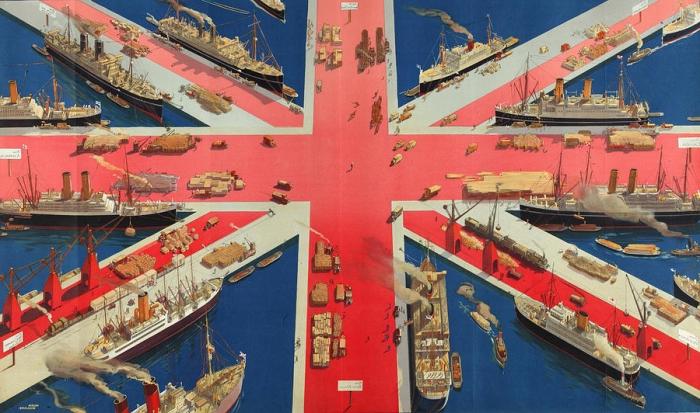 Британское могущество
Британское могущество
Империя расширяла свои территориальные владения на протяжении более двух сотен лет, пока на планете не осталось ни одного континента, где бы не находились англоговорящие страны. Принято считать, что пик ее могущества пришелся на начало XX века – собственно, период, когда территории третьего мира были окончательно разделены на колонии. И английская корона смогла поживиться весьма лакомыми кусками этого пирога.
Англоговорящие страны возникали на землях относительно свободных континентов вроде Америки и Австралии. Отстающие в техническом отношении государства Азии и Африки тоже активно вовлекались в орбиту британского влияния. Более того, еще задолго до Первой мировой войны именно англичане продемонстрировали пример насильственного перераспределения колониальных территорий, вступая в борьбу за «испанское наследство» в Северной Америке, за территории в Индии - с голландцами и за богатую алмазными месторождениями Южную Африку - с обосновавшимися здесь бурами, потомками немцев и голландцев.
 В ходе своей экспансии Британская империя активно распространяла в колониях собственный язык, правовое и административное устройства, культуру. Если еще в конце XVIII века даже в нашем отечестве в высших слоях общества был в моде французский язык, то на протяжении XIX векаситуация меняется – английский постепенно становится доминирующим языком во всем мире.
В ходе своей экспансии Британская империя активно распространяла в колониях собственный язык, правовое и административное устройства, культуру. Если еще в конце XVIII века даже в нашем отечестве в высших слоях общества был в моде французский язык, то на протяжении XIX векаситуация меняется – английский постепенно становится доминирующим языком во всем мире.
Англоговорящие страны как наследие империи
Последний этап процесса деколонизации на нашей планете происходил уже после Второй мировой войны. В это время лишилась большинства своих колоний Франция. Значительные изменения произошли и в британском мире. Современные англоговорящие страны в большинстве своем либо когда-то были заселены выходцами с острова, как Канада, Австралия или Новая Зеландия, либо являются бывшими колониями. Например, английский язык является одним из официальных и широко используемых в Нигерии, Индии, Ямайке и многих других странах. Однако Британская империя, как и Французская, канула в Лету. Бывшие в ее подчинении субъекты один за одним выходили из-под власти англичан, обретая независимость.
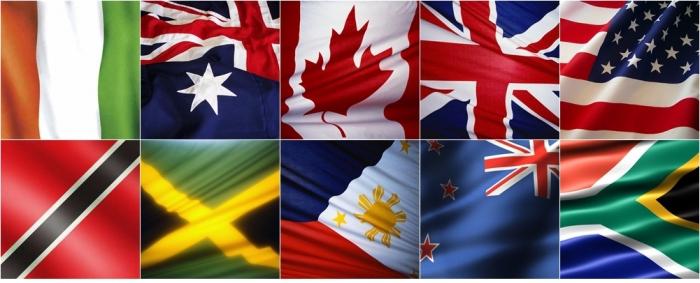 Вместе с тем англоговорящие страны, список которых сегодня весьма широк, в большинстве своем пожелали сохранить теплые отношения и некоторую связь с бывшей метрополией. Так, Британское содружество наций появилось еще во второй половине XIX века. Однако свое окончательное формальное закрепление оно получило лишь в середине XX века. Сегодня в него входят 14 территорий, не считая самого острова. Многие из этих государств до сегодняшнего дня символом своей нации считают английскую королеву. Она символический глава Канады, Тринидада, Новой Зеландии, Австралии, Барбадоса и целого ряда других государств. Не менее значительным является имперское наследие и для остального мира. Англоговорящие страны (реферат, статья или даже любая заметка по теме вам это подтвердит) сегодня являются доминирующими, а во главе их списка (после Великобритании) - Соединенные Штаты. Англосаксонская система права распространена во многих регионах мира. Не менее обязаны своей распространенностью английскому (да и в целом – европейскому) доминированию в мире такие институциональные системы, как парламентаризм, гражданское общество и так далее. Не говоря уже о языке, как главном инструменте международной коммуникации на сегодняшний день.
Вместе с тем англоговорящие страны, список которых сегодня весьма широк, в большинстве своем пожелали сохранить теплые отношения и некоторую связь с бывшей метрополией. Так, Британское содружество наций появилось еще во второй половине XIX века. Однако свое окончательное формальное закрепление оно получило лишь в середине XX века. Сегодня в него входят 14 территорий, не считая самого острова. Многие из этих государств до сегодняшнего дня символом своей нации считают английскую королеву. Она символический глава Канады, Тринидада, Новой Зеландии, Австралии, Барбадоса и целого ряда других государств. Не менее значительным является имперское наследие и для остального мира. Англоговорящие страны (реферат, статья или даже любая заметка по теме вам это подтвердит) сегодня являются доминирующими, а во главе их списка (после Великобритании) - Соединенные Штаты. Англосаксонская система права распространена во многих регионах мира. Не менее обязаны своей распространенностью английскому (да и в целом – европейскому) доминированию в мире такие институциональные системы, как парламентаризм, гражданское общество и так далее. Не говоря уже о языке, как главном инструменте международной коммуникации на сегодняшний день.
fb.ru
Реферат на тему «Англоговорящие страны культура и традиции»
Англоговорящие Страны: Культура и Традиции
Слово "культура" имеет различные значения. Это часто обращается к музыке, литературе, искусству, и высшему образованию. Это также означает таможню общества и пути, которым люди взаимодействуют с друг другом.
Каждая культура имеет определенные основные идеи, которые каждый принимает для предоставленного. Они - фундаментальные вещи, которые каждый "знает" от его или её детства, и которые являются автоматическими людям, которые живут в той культуре. Они включают все от общих знаков внимания и деталей ежедневной жизни к более глубоким проблемам места человека в обществе, семьи, жизни и смерти.
Когда человек входит в новую культуру, основная таможня и идеи, которые он или она автоматически принял, возможно, больше не верны. Человек оказывается перед новым набором таможни и отношений, чтобы пробовать понять. Позвольте нам изучать некоторые элементы культуры Англоговорящих стран и традиций.
. Представление там очень просто: Вы заявляете ваше название, где Вы живете и ваше занятие. В формальной ситуации используют ваши первые и последние названия. В стороне или в социальном урегулировании, используйте ваше имя только. Мужчины представлены женщинам, молодые люди к старшим, старые друзья вновь прибывшим, и молодым девочкам к женатому. Обычно женщины не представлены человеку.
Вводя каждый говорит кое-что как: "госпожа Смит, может я представлять г. Брауна", и затем превращение госпоже Смиту просто говорит "госпожу Смита". Обычный ответ на введение - "Как Ваши дела ?", который является своего рода поздравлениями и не вопросом - очень формальный. Можно сказать кое-что менее формальное: "Хороший встречать Вас," "я рад встретить Вас," или "Счастливый встретить Вас." Если Вы не знает название человека, говорят "Сэр" человеку или "Госпоже" женщине. Если семейное положение леди неизвестно, она должна быть названа как госпожа [miz]. Однако, было бы намного более цивилизованное изучить название человека и сказать: "Хороший встречать Вас, госпожу Браун." Люди обычно обмениваются рукопожатием твердо особенно когда формально введено, но они не всегда обмениваются рукопожатием с людьми, которых они видят часто.
Определенные типы поведения ожидаются в Англоговорящих странах. Американская идентичность очень перевязана с домашним происхождением. Беседы между двумя американцами, чтобы встретиться за границей будут обычно включать раннее, сосредотачиваются на домашних государствах или колледжах, тогда как это маловероятно с двумя Англичанами (предполагающий, что они говорили с друг другом вообще). Прозвища очень чаще используются в США чем в Великобритании.
Люди в обеих странах рассматривают время как дорогой объект или 'материал. Они говорят об этом многими различными способами. Они экономят это, тратят впустую это, тратят это, убивают это. Они имеют свободное время, досуг, свободное время. Они вкладывают капитал в это и тщательно планируют это. Тогда никогда не опоздайте. Это не традиция, чтобы заглядывать к знакомым без запроса. Будьте вежливы и дружественные в общественных местах. Фразы как "Извиняют меня" и "я сожалею", используются намного более часто чем в России. Люди там также очень заинтересованы уходом. Ежедневно ливни и набор fr.eshодежды - норма. Никогда не спросите людей их возраст. Улыбка и люди улыбнутся с Вами.
Я буду. OTBeTbTenaeonpocbi.
1. Каковы два значения слова "культура"?
2. Как Вы обращаетесь к незнакомцам?
3. Представьтесь формально.
4. Представьтесь неофициально.
5. Что человек может сделать с его/ее временем?
.6. Действительно ли необходимо назначить встречи в России? Когда это необходимо? Когда не это необходимый?
KoMMewrap
111. 3anoMHMTe 3-ый cnoBaw cociaBbTechmmmnpeA/ioxeHwa.
| Существительные | CyiijeciiieumejibHbie |
| введение | ocjiHMHa/ibHoe npeAcTaBJiemie |
| сначала / христианин / данный название | HMJI |
| фамилия / секунда / длится / фамилия | (fjaMHJlHfl |
TecTXI. h4 MeTbipexnpeA^oxeHHbixBapnaHTOBBbiSepmeeflMHCTBeH-
1. Стог хотел бы найти... действительно хорошая работа.
A. a
B.
C.
D . -
2. Они не сделали ... слово об их планах.
A. сказать .
B. разговор
C. говорить
D. сказать
3.Интересно когда она... завтра.
A. прибыл бы
B. прибудет
C. прибывает
D. прибытие
4. Счет не ..., поскольку я думал, что это будет.
A. такое дорогое
B. дорогой
C. столь дорогой
D. более дорогой
5. Никто... Джулия, чтобы прибыть столь поздно.
A. ожидаемый
B. ждавший для
C. разыскиваемый
D. ожидавший
6. Если бы это .. столь поздно я назвал бы Вас.
A. не имеет
B. не был
C. не имел
D. не был
7. Правление ... все мои предложения.
A. брошенный
B. выключаемый
C. отказанный
D. подавленный
8. Мы путешествовали по большому количеству ... поездом и на машине.
A. также
B. или
C. оба
D . ~
9. Современный английский язык начался... пятнадцатое столетие.
A. в
B.
C. от
D. в
10. Питер выглядел очень взволнованным....
A. в последнее время
B. на днях;.
C на днях
D. на следующей неделе
II Я хочу пить, я хотел бы немного минеральной воды, но мы не имеем
A. некоторые
B. любой
C. ничто
D. что - нибудь
12. Менеджер сказал его секретарю...на работе.
A. не курить
B. не курить
C. не курят
D. никакое курение
13. Встреча была отменена. .. тяжелый снегопад.
A. в результате
B. хотя
C. из-за
D. потому что
14. Викай спросила Маму ..., в то время как она была по телефону.A. не говорить
B. не говорить
C. не говорил
D. не говорят
15. Энн пошла в Англию ..., она могла улучшить ее английский язык
A. чтобы
B. долг
C. так, чтобы
D. хотя
16. Я действительно интересуюсь Экономикой.... Я.A. Так что сделайте
| B | Ни один |
| C. | Ни один не |
| D. | Так |
| 17. | Я печати.... начиная с Рождества. |
| A. | собрались |
| B. | собирался |
| C. | собираются |
| D. | забранный |
| 18. Комитет настаивал ..., принимающий решение сразу | |
| A. | в |
| B. | о |
| C. | на |
D. в
19. Мы имеем наш английский класс... В понедельник утром.
A. в
B. в
C. для
D. на
20. Если Вы. их заранее, они прибудут.
A. информированный
B. сообщить
C. сообщит
D. сообщил бы.
flono/iHMTe/ibHbietoko™ /
XII. FlposMTaPiTe v\ nepeBeAwe oneAyiomwii'TeKCT. Bbjnwuweм. BbiyHMie He.
Приглашения
Если Вы имеете сторону, Вы можете назвать ваших друзей и пригласить их. Вы можете также послать письменное приглашение, которое было бы большим количеством чиновника. Приглашения могут быть написаны на специальных картах или по буквам. Когда послано почтой, они должны дать следующую информацию: дата, время, место, вид стороны, которая сторона - для, и кто дает сторону. R.S.V.P.meens, что Вы спрашиваете те, кто получит приглашение, чтобы назвать Вас или послать Вам сообщение, указывающее, будут ли они или не будут прибывать. (R.S.V.P. - с французского языка, означая "Пожалуйста, ответ").
Форма принятия или сожаления зависит от формы полученного приглашения. Если Вы хотите, чтобы люди звонили, Вы должны включить ваш телефонный номер.
Иногда приглашение определит тип платья - формальный или неофициальный.
Формальный: "Галстук - бабочка" означает смокинг для мужчин,
"Белая связь" означает полный вечерний наряд (хвосты) для мужчин, вечернее платье для женщин.
Неофициальный: темный пиджачный костюм для мужчин и изящный (коктейль) платье для женщин.
Случайный: каждый день платье.
Примечания слов благодарности обычно пишутся, чтобы благодарить кого - то за подарок, или за то, чтобы позволить Вам оставаться несколько дней в доме. Некоторые примечания спасибо имеют печатное сообщение, и Вы можете только подписать ваше название. Другие не имеют печатного сообщения, разрешающего Вам написать ваше собственное.
Партийный Этикет
1. При получении приглашения дают ваш "да" или ответ "Нет" быстро.
2. Никогда не нарушите обязательство без предварительного уведомления. Если Вы не можете сделать это, напишите или телефон, чтобы выразить ваше сожаление.
3. Не приезжайте перед временем, обозначенным в приглашении. Пробуйте не быть поздно. Приедьте вовремя.
4. Не обменяйтесь рукопожатием с хозяйкой, если она не дает ее.
5. Встаньте когда введено. Леди могут остаться помещенными.
6. Покажите вашу оценку предлагаемого гостеприимства.
7. Оставляя сторону, благодарите хозяина и хозяйку, говорите до свидания, но не привлекайте неуместное внимание других гостей.
8. Не застрять. Не нарушайте границу гостеприимства хозяина.
9. Не нажимать завтрак, особенно сильные напитки на несклонных гостей.l0. Хозяин и хозяйка должны видеть, что никем не пренебрегают, что все
гости вовлечены в беседу общей природы, что все они обладают стороной.
11. Написать примечания спасибо, чтобы благодарить кого - то за подарок или за то, чтобы позволить Вам оставаться в доме хозяина в течение нескольких дней.
Этикет Стола
1 не привлекают неуместное внимание к вам непосредственно публично.
2,при еде, возьмите столько, сколько Вы хотите, но едите столько, сколько Вы берете.
3 не едят слишком быстро или слишком медленно, не чавкайте, при еде.
4 не говорят с вашим полным ртом.
5 Берут немного каждого блюда, которое предлагается Вам.
6 не достигают поперек стола. Если кое-что имеет с другой стороны
стол, говорят, "Пожалуйста передайте соль?"
7. Не начинайте есть, когда каждому служат, если хозяйка не говорит "еду Начала, пожалуйста, ваша пища могла бы простудиться."
8. Отказываясь от блюда, скажите "нет, благодарить Вас."
9. Принимая блюдо, скажите "да, понравьтесь." Если Вы хотите еще часть блюда, говорите, что "я могу иметь еще немного мяса (рыба, салат, пирог, и т.д.)?"
10. Не оставляйте ложку в вашей чашке, при питье чая или кофе. Поместите это в специальный стенд или в блюдце.
11. Съешьте пироги с вилками, не черпает.
! 2. Указывать, что Вы закончили (имели достаточно), нож места
и вилка на пластине вместе, не перекрещенный.13. Не желать друг другу "приятного аппетита."
botanim.ru
|
|
..:::Счетчики:::.. |
|
|
|
|
|
|
|
|


